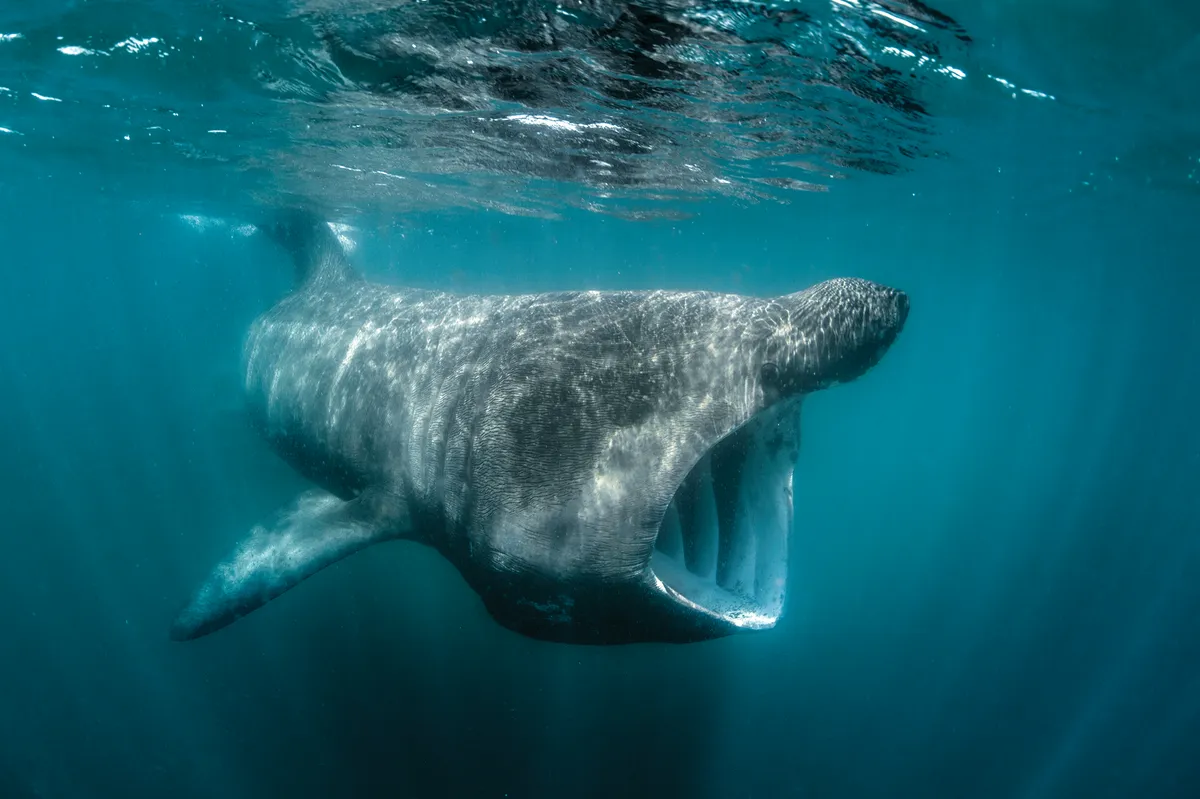The UK’s diverse coastline encompasses an array of magical underwater habitats, ranging from rocky reefs and kelp forests to sandy seabeds and seagrass meadows.
This rich tapestry of environments provides a home for an incredible diversity of marine species. Divers and ocean enthusiasts exploring these fascinating underwater worlds have the chance to spot a whole host of weird and wonderful creatures, from vibrant anemones and mighty basking sharks, to playful seals and graceful seahorses.
- 10 weird animals that call the British Isles home
- Breathtaking photographs of life beneath the UK’s seas
- Best dive sites in UK: Discover 11 magical underwater worlds
Join the experts from PADI (Professional Association of Diving Instructors) as they reveal the weirdest and most spectacular creatures found in British waters.
Weirdest sea creatures
Basking shark

Snorkellers and wild swimmers can encounter the awe-inspiring basking shark, the world’s second-largest fish, off the coast of England, Scotland and Ireland. Areas such as Falmouth Bay and the Lizard Peninsula in Cornwall provide excellent opportunities to witness these gentle giants gliding through the water, feeding on plankton.
The Isle of Man and the Inner Hebrides have fin-tastic sightings during the summer months, too – sometimes in huge aggregations! Always keep your distance and observe the code of conduct to have the best encounter.
Tompot blennies
Tompot blennies are undoubtedly one of the most sought-after sights for British divers. Their cheerful faces are a photographer's favourite – one was even used as the cover image for marine biologist Paul Naylor much-loved book Great British Marine Animals.
The tompot blenny is a common fish living close to shorelines and one of 900 blenny species. Peeking out of shallow rocky crevices or wrecks, these photogenic critters are instantly recognisable with their wide grin, big eyes, and the two giant antlers (OK, tentacles) on top of their head. Almost eel-like, these bottom-dwellers wriggle, with surprising speed, rather than swim.
Did you know tompot blennies can be identified by their unique face markings?
Grey seal

These curious marine mammals will captivate you with their acrobatic underwater displays. The UK is home to 40% of the globe’s population of grey seals. Watch out for one nibbling on your fins if you're diving!
Beadlet anemone

Vibrant beadlet anemones adorn rocky seabeds around the UK. Loch Fyne and Loch Carron are particularly good doe divers seeking these striking creatures, which showcase shades of red, orange and green. Witness the dance of life as tiny fish and crustaceans seek refuge in their swaying tentacles. Marine life doesn’t need to be big to be brilliant.
Orange-clubbed sea slug

The artistic beauty of the orange-clubbed sea slug can be found by eagle-eyed divers along the coast of the Isle of Man. Port Erin Bay and Douglas Bay are the perfect dive sites to spot these teeny tiny, exquisite creatures. With their vibrant orange colouration and intricate patterns, these sea slugs are a photographer’s dream come true.
Cuckoo wrasse

Who said fish in the UK are dull? Relish a colourful underwater escapade in the Scilly Isles, where the cuckoo wrasse reigns supreme. Dive sites such as St. Mary’s and Tresco offer memorable sightings of these dazzling fish. Watch out for males donning an electric blue hue, captivating divers with their courtship dances and territorial displays.
Common cuttlefish

Uncover the secrets of the common cuttlefish (one of the world's weirdest fish), masters of disguise, along the Dorset coast. Kimmeridge Bay and Lulworth Banks provide divers with a chance to witness their shape-shifting abilities. You’ll be enchanted by their rapid colour changes and hypnotic displays as they navigate their sandy habitats.
Discover other animals that can change sex
Barrel jellyfish
For jellyfish lovers, experience the serenity of the barrel jellyfish in the pristine waters of Pembrokeshire. Skomer Island and St. Bride’s Bay – all known dive sites for these beautiful creatures. Though harmless, their ethereal presence, with their pulsating bodies and translucent tentacles, creates an otherworldly underwater ambience.
- What is the biggest jellyfish in the world? Meet a monster jelly
- Can jellyfish sting even when they're dead?
Short-snouted seahorse

Venture out on a treasure hunt through the estuaries of Devon, where the elusive short-snouted seahorse resides. Salcombe Estuary and Torquay Harbour are where you can find these graceful wonders. As a diver, wait patiently among the seagrass beds and you will soon be marvelling at the intricate patterns and unique appearance for these enchanting creatures.
- Why do seahorses look like horses?
- How and why do male seahorses get pregnant?
- How and why do seahorses change colour?
Great spider crab
Delve into the eerie world of great spider crabs in the waters around the Isle of Man. Dive sites such as Port Erin and Peel Bay offer glimpses of these spindly creatures. Watch as they skulk among the wreckage, their long limbs and peculiar movements creating a captivating sight for divers.
- Most spectacular snorkelling sites in the UK
- Best wildlife snorkelling and diving sites in the world
“As a UK diver, the diversity of marine life found around our coast never ceases to amaze me," says Miranda Krestovnikoff PADI AmbassaDiver, Broadcaster & Author, "from colourful corkwing wrasse who build their nests out of seaweed, to territorial tompot blennies hiding in rocky crevasses, who can be individually identified by their unique facial features and ugly wolffish lurking in the depths with their fearsome looking teeth.
"Every dive is a real adventure full of new discoveries which is why it is so important that our marine life has adequate protection,”
About PADI
PADI (Professional Association of Diving Instructors) is the largest purpose-driven diving organisation with a global community of 6,600 dive centres and resorts, 128,000 professional members and more than 30 million certified divers to date. For over 50 years, PADI has been prividing high quality dive training, underwater safety and conservation initiatives.